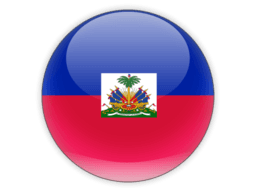
Regions of Haiti
Explore 10 regions
Cities of Haiti
Discover 47 cities across 10 regions
Artibonite(7)
Nippes(1)
Nord(7)
Nord-Ouest(4)
Ouest(14)
Sud-Est(1)
Haiti is a country located in the Caribbean region of North America, sharing the island of Hispaniola with the Dominican Republic. The capital and largest city is Port-au-Prince. Haiti has a rich and complex history, with influences from the indigenous Taíno people, African slaves brought over by French colonizers, and French colonial rule.
Haiti is known for its vibrant culture, including music, dance, art, and cuisine. The country is home to several UNESCO World Heritage sites, such as the National History Park – Citadel, Sans Souci, Ramiers and the historic center of Cap-Haïtien.
Tourism is an important industry in Haiti, with attractions such as its beaches, waterfalls, and natural parks. Some popular destinations include Labadee, a private resort owned by Royal Caribbean, the beaches of Jacmel, and the Citadelle Laferrière, a mountaintop fortress.
However, Haiti also faces significant challenges, including poverty, political instability, and natural disasters such as earthquakes and hurricanes. Visitors to Haiti should take precautions for their safety and security, including staying aware of their surroundings, avoiding large crowds, and following local guidance.
Telephone Code
509
Local Emergency Phone
Ambulance: 118; Police: 114
Vaccinations
See WHO recommendations
Climate
Tropical; semiarid where mountains in east cut off trade winds
Currency (Code)
Gourdes (HTG)
Electricity/Voltage/Plug Type(s)
110 V / 60 Hz / plug types(s): A, B
Major Languages
French, Creole
Major Religions
Protestant/Methodist/Adventist/Jehovah's Witness 51.8%, Roman Catholic 35.4%, Vodou 1.7%
Potable Water
Opt for bottled water
International Driving Permit
Suggested; additionally, if you plan to drive in Haiti, you will need an Inter-American Driving Permit issued by the AAA
Road Driving Side
Right
Tourist Destinations
National History Park (includes Sans-Souci Palace, Citadelle Laferriere, Ramiers); Bassin Bleu; Île-à-Rat; Musée du Panthéon National; Promenade du Bord de Mer
Major Sports
Soccer, basketball
Cultural Practices
Whistling and pointing are considered rude.
Tipping Guidelines
Restaurant staff should be tipped around 10% of the bill. Taxi drivers can be given a discretionary tip if they are helpful and efficient.
Souvenirs
Straw hats, metalwork sculptures, papier-mache items, woodcrafts, voodoo items
Traditional Cuisine
Griot (or Griyo) — pork shoulder marinated in citrus, which is braised and then fried; often served with diri ak pwa wouj (red beans and rice)
Geography
Area
total: 27,750 sq km
land: 27,560 sq km
water: 190 sq km
Climate
tropical; semiarid where mountains in east cut off trade winds
Natural resources
bauxite, copper, calcium carbonate, gold, marble, hydropower, arable land
People and Society
Population
11,470,261 (2023 est.)
Ethnic groups
Black 95%, mixed and White 5%
Languages
French (official), Creole (official)
Religions
Catholic 55%, Protestant 29%, Vodou 2.1%, other 4.6%, none 10% (2018 est.)
Population growth rate
1.18% (2023 est.)
Government
Government type
semi-presidential republic
Capital
name: Port-au-Prince
Economy
Economic overview
small Caribbean island economy and OECS-member state; extreme poverty; enormous income inequalities; destabilization due to recent presidential assassination; US preferential market access; deteriorating human capital and infrastructure investments
Real GDP (purchasing power parity)
$32.856 billion (2021 est.)
Real GDP per capita
$2,900 (2021 est.)
Agricultural products
sugar cane, cassava, mangoes/guavas, plantains, bananas, yams, avocados, maize, rice, vegetables
Industries
textiles, sugar refining, flour milling, cement, light assembly using imported parts
Exports
$1.241 billion (2021 est.)
Exports - partners
United States 81%, Canada 7% (2019)
Exports - commodities
clothing and apparel, eels, essential oils, perfumes, mangoes, cocoa beans (2019)
Imports
$5.222 billion (2021 est.)
Imports - partners
United States 39%, China 22%, Turkey 5% (2019)
Imports - commodities
refined petroleum, rice, clothing and apparel, palm oil, poultry meats (2019)
International Airports in Haiti
Discover 4 major airports serving Haiti
Mark Haiti as Visited
Add Haiti to your personal travel map and track your journey around the world. Share your adventures and see your progress grow!